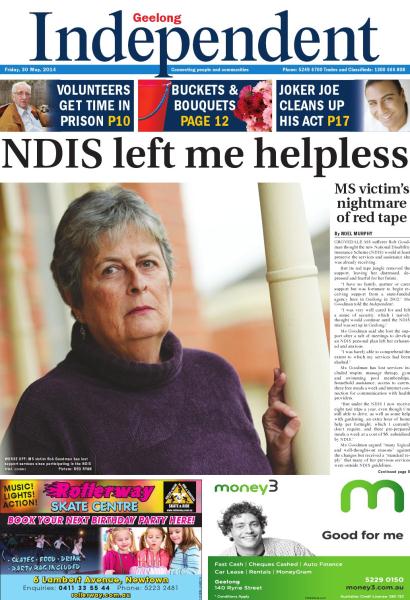John Van Klaveren
A “very high” satisfaction rating for Australia’s National Disability Insurance Scheme (NDIS) has conflicted with the reported experiences of participants in Geelong.
The NDIS this week said its latest quarterly data included a participant satisfaction rating of 1.66 on a scale from -2 for very poor to +2 for very good.
Bruce Bonyhady, the chairman of NDIS delivery body National Disability Insurance Agency, said the early data should be “approached with caution” but a “picture was starting to emerge”.
He was pleased with the “consistently high” satisfaction rating for the scheme, which has been operating in Geelong and three other trial sites around Australia since July 2013.
“However, we are committed to listening to and learning from people’s experiences with the scheme in order to continually improve it,” Mr Bonyhady said.
“Participant satisfaction to date is also reflected in the very few appeals lodged with the Administrative Appeals Tribunal – just 19 to date.
“This level is unheard of for a human services organisation and, I believe, demonstrates that people with disability and their families are well-informed of the decision-making process.”
However, in June health economist Dr Katrina Alford told the Independent the “reprehensible” NDIS was keeping participants in the dark on complaint procedures.
“Ninety-nine” per cent of them were unaware they could take rejected complaints to the Administrative Appeals Tribunal, she said.
Dr Alford contacted the Independent after it began reporting complaints about the Geelong trial, beginning in May when Grovedale MS victim Rob Goodman revealed how the NDIS stripped her of various support services.
Ms Goodman’s story prompted other trial participants to come forward with similar complaints.
A government-commissioned review reported in July that the NDIS had numerous problems including “constraints” in the ability of trial sites to “represent the breadth of participants” and services covered by the scheme.
Mr Bonyhady said the quarterly data indicated the NDIS was also operating within targets for response times and costs.
“What we are seeing is a scheme built on evidence – continually identifying and implementing better ways of doing things, and adjusting to its surroundings. The time it takes for an access decision to be made is testament to this,” he said.
The average time taken to determine eligibility from launch in July last year to the end of December was 29.7 days. In the last six months to June 30 this has more than halved to 13.3 days.
“This significant improvement is the result of a number of operational reforms within the agency and reflects its effective learn-build-learn-build approach. The NDIS is all about the people it supports and the agency will continue working to streamline its processes to benefit them and their families.”
Mr Bonyhady said the average “package cost” for the first 12 months was $34,600 compared to the “funding expectation” of $35,000.
The four NDIS trial sites had so far “committed” more than $130 million in assistance to participants.









